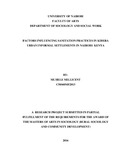| dc.description.abstract | This study sought to assess the factors influencing sanitation practices in urban informal settlements with a focus on Kibera, Nairobi. The objectives of the study were to: Establish the common sanitation practices; Find out the levels of awareness on existing safe sanitation practices; Establish the factors that influence household choice on the type of sanitation practice; and Identify specific actions required to make safe sanitation practices effective. There is limited research which has been conducted to explore the influencers of sanitation practices in informal settlements. This study therefore examined the factors influencing sanitation practices in informal settlement, Kibera. The literature review on sanitation practices, specifically were; sanitation situation in Kenya, characteristics of informal settlements and common causes of unhygienic practices. This study was guided by the following theories; Theory of planned behaviour, Social Cognitive theory and People-centred theory of development. The target population for the study was household heads. The research selected a random sample size of 96 household heads. The study used quantitative and qualitative methods of data collection. The tools used were questionnaires key informant interview guide and an observation checklist. The study found out that majority of the resident‘s water supply was from the water vendors (57%).The findings showed that 41.3% of the residents used public latrine of which about 82.4% reported that they paid for the use of the latrines. It was also found out that only 2.1% of the respondents burnt their solid waste while 46.8% disposed in the open space. Majority of the respondents 60% did not wash their hands after visiting a toilet. The study revealed that the main source of information on sanitation to the residents was through the mass media (46.8%). This study recommends that Kibera residents should uphold community initiatives to ensure that they promote sanitation practices in the households, campaigns on sanitation practice to consider the different cultures and socioeconomic status of the residents. Further research to be conducted to establish partnerships for the government, community and other stakeholders to promote sanitation. | en_US |

